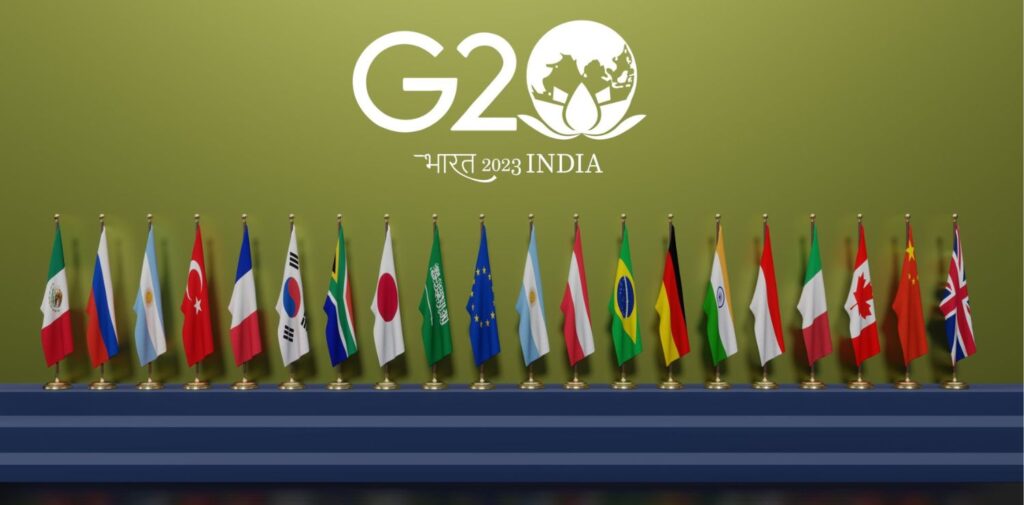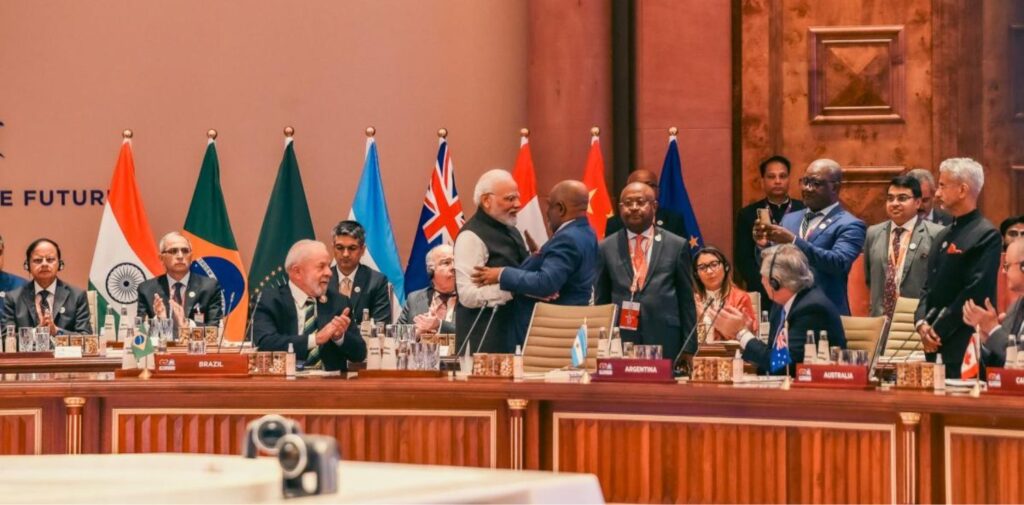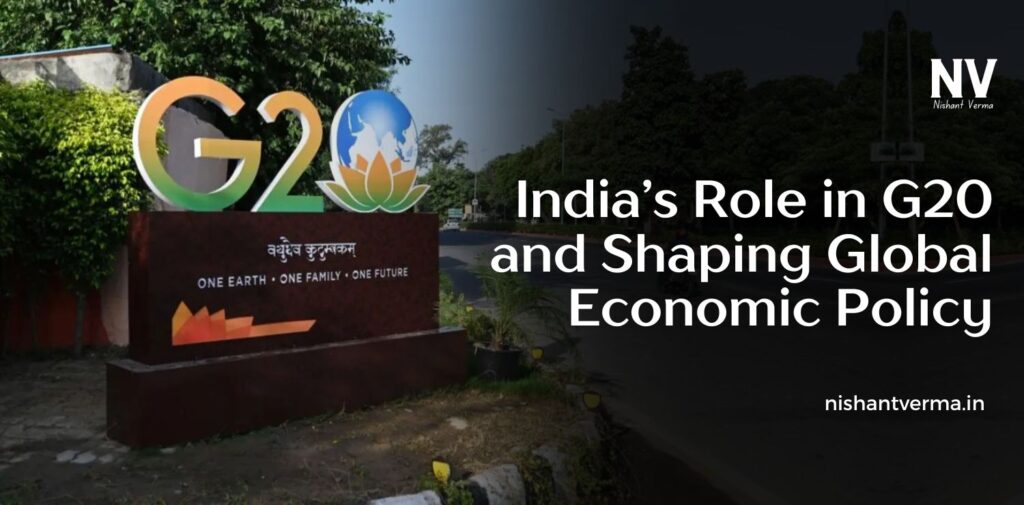India, one of the world’s largest and fastest-growing economies, has played an increasingly important role in global economic affairs. As a member of the Group of Twenty (G20), India Role in G20 and Shaping Global Economic Policy. The G20, which brings together the world’s major advanced and emerging economies, provides a platform for discussions on key global issues such as economic growth, trade, climate change, and international financial stability. India’s participation in this forum is vital not only for the country’s economic growth but also for shaping a more inclusive, sustainable, and resilient global economy.
Understanding the G20 and India’s Membership
The G20, formed in 1999, is an international forum consisting of 19 countries and the European Union. The members represent around 85% of global GDP and two-thirds of the world’s population. This group includes both developed economies like the United States, Germany, and Japan, and emerging markets such as China, Brazil, and India. The G20 meetings bring together heads of state and government, finance ministers, and central bank governors to discuss and address global challenges.
India’s role in the G20 has been pivotal, especially in recent years. With a population of over 1.4 billion, a rapidly growing economy, and a strategic geopolitical position, India is a major player in global economic policy discussions. As the world’s fifth-largest economy by nominal GDP, India brings unique perspectives to the table, particularly in matters related to development, trade, and climate action.

India’s Economic Growth and Influence in the G20
India’s economic trajectory has been impressive, and it continues to grow at a remarkable pace. As the world’s most populous democracy, India has emerged as a significant economic force with a large, young workforce, a thriving technology sector, and an expanding middle class. This growth has enhanced India’s influence in global economic affairs, particularly within the G20.
India has consistently advocated for the interests of developing countries in the G20, urging for policies that promote inclusive growth. As a member of the G20, India pushes for reforms in global institutions like the International Monetary Fund (IMF) and the World Bank, which are seen by many developing nations as dominated by the interests of the global North. India’s voice in the G20 has been crucial in advocating for the financial and economic needs of emerging economies, ensuring that the benefits of globalization are shared more equitably.
India’s Contributions to G20 Economic Discussions
India has made significant contributions to discussions on several important global economic issues. One of the major areas where India has had a strong influence is in promoting multilateralism and global trade. India has consistently called for fairer trade practices and better representation for emerging economies in global trade agreements. In particular, India has emphasized the need for the World Trade Organization (WTO) to be more inclusive and to address the concerns of developing countries.
Another key area where India has played a critical role is in the fight against poverty and inequality. India has pushed for policies that promote sustainable development, job creation, and poverty reduction. Through the G20, India has worked to ensure that economic growth is not just about increasing GDP but also about improving the lives of ordinary people. India has also advocated for investments in education, healthcare, and infrastructure, especially in developing nations.
Additionally, India has been at the forefront of pushing for more focus on climate change within the G20 framework. India has worked to bridge the gap between the developed and developing worlds by calling for climate action that is fair and equitable. India supports the idea that developed countries should take on greater responsibility in addressing climate change, given their historical contributions to global emissions. At the same time, India advocates for financial and technological support for developing countries to help them transition to more sustainable energy sources.

India’s Leadership in Shaping Global Economic Recovery
In the wake of the COVID-19 pandemic, the G20 became an important platform for discussing the global economic recovery. India played a leading role in advocating for coordinated global action to overcome the economic and social challenges caused by the pandemic. India called for greater support for vulnerable economies and global cooperation in vaccine distribution, debt relief, and economic stimulus packages.
India’s leadership during the pandemic highlighted its growing influence in global economic governance. As a member of the G20, India emphasized the importance of solidarity and collective action in times of crisis. India also underscored the need for global economic recovery to be inclusive, ensuring that the most vulnerable populations, especially in developing countries, are not left behind.
India has also been a strong advocate for a fair global tax system and has pushed for reforms in the international tax architecture to tackle issues like tax avoidance and base erosion. The global minimum tax agreement, which was endorsed by the G20 in 2021, is an example of India’s influence in shaping a more equitable global economic system.
India’s Vision for a Sustainable Global Economy
As the world grapples with challenges such as climate change, environmental degradation, and resource depletion, India has emerged as a leader in advocating for a sustainable global economy. India has been a strong proponent of green growth, which balances economic development with environmental sustainability. Through the G20, India has called for increased investments in renewable energy, energy efficiency, and climate-resilient infrastructure.
India’s own efforts to transition towards a green economy, including its ambitious renewable energy targets and commitment to the Paris Agreement, have made it a key player in global climate discussions. India has also been active in pushing for greater climate finance and technology transfer from developed countries to developing nations, which are often the most vulnerable to the impacts of climate change.
Furthermore, India has played a crucial role in advocating for a just energy transition, which ensures that the shift to renewable energy does not leave behind workers and communities that rely on traditional energy sources. India’s emphasis on inclusivity in the green transition has resonated with many other developing countries in the G20.

The Road Ahead: India’s Growing Role in Global Economic Governance
India’s role in the G20 will continue to evolve as the country’s economy grows and its global influence increases. With its leadership in areas like trade, development, climate change, and economic recovery, India is well-positioned to continue shaping global economic policy in the coming years. India’s unique position as both a major emerging economy and a representative of the Global South allows it to play a crucial mediating role in global economic discussions.
In the future, India will likely take on a more prominent role in global economic governance, advocating for reforms in international institutions to make them more reflective of the realities of the 21st century. India’s commitment to inclusive growth, sustainability, and multilateralism will continue to guide its contributions to the G20 and its influence on shaping global economic policy.
As the world faces new challenges, from the economic impacts of climate change to the disruptions caused by emerging technologies, India’s leadership in the G20 will be crucial in ensuring that the global economy is fair, resilient, and sustainable for future generations. Through its active participation in the G20, India will continue to help shape a world where economic prosperity is shared by all, and the benefits of growth reach every corner of the globe.
Conclusion: India Role in G20
India’s involvement in the G20 is not just about participating in global discussions but about actively shaping the future of the global economy. As one of the world’s largest and most dynamic economies, India brings vital perspectives on inclusive growth, sustainable development, and global cooperation. Through its leadership and advocacy, India has been instrumental in influencing global economic policies that promote fairness, equity, and resilience. India’s growing influence in the G20 underscores its commitment to building a better, more sustainable world for all.




